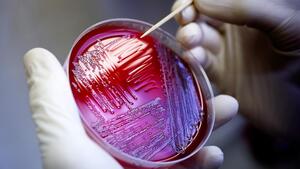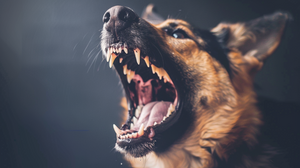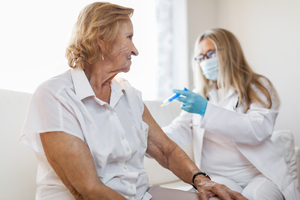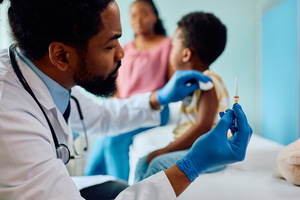Key points
- Prevent cross-contamination by keeping raw food juices from contacting other foods.
- Keep hot foods hot and cold foods cold to avoid spoilage.
- Cook foods thoroughly, using a cooking thermometer to ensure safe temperatures.
- Maintain cleanliness in food preparation and cooking, including utensils, grills, and hands.
- The article concludes by stating that with proper care, cleanliness, and storage, family BBQs can be enjoyable without the risk of food poisoning.
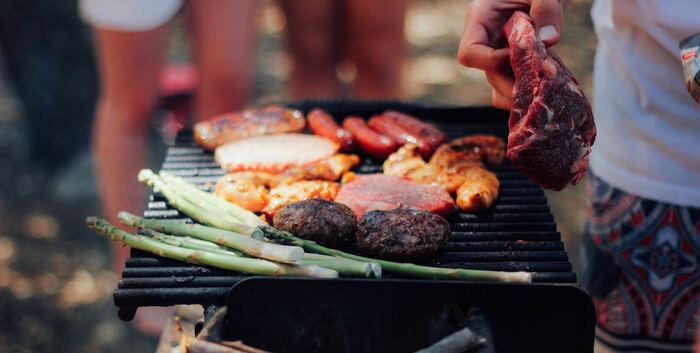
Summertime is BBQ time! It's a time to dust off our grills and buy the meats, poultry, fish, and vegetables we love and invite the gang over for tasty, but tempting meals. Barbecuing also means being careful and learning how to avoid food poisoning. Here are four tips for a bacteria-free BBQ.
Related: 2021 Summer Vacation checklist →
1. Understand Food Cross-Contamination
Even the little ones love a hot dog or burger, but to avoid food poisoning and the need for pediatric urgent care, or adult medical care, don't cross-contaminate food. This simply means not allowing the raw juices of foods, such as meats, to come in contact with other foods.
Uncooked meat and fish are full of juices, but if these juices contact other foods like a hotdog, vegetables or fall into a salad, they can spread bacteria and cause food poisoning. Avoid the chances of raw juices mixing with other foods by using separate cooking plates and cleaning plates and utensils before reuse.
2. Don't Leave Foods Out in the Heat
Salads made with mayonnaise or other dairy products don't last long in the sun. A good rule of thumb is to "Keep hot foods hot and cold foods cold." That means leaving hot food on the grill or in warming dish until it's served. Likewise, cold foods like potato salads, deviled eggs, and macaroni salads should be kept fresh and clear of bacteria by using ice blocks inside coolers or large tubs.
3. Cook Foods Thoroughly
You might want a medium-rare burger, but it's best to cook foods thoroughly to avoid food poisoning. If you're the chef, use a cooking thermometer and test meats, poultry and fish before serving and keep these temperatures in mind:
- Don't serve poultry until the thermostat reads 165 degrees Fahrenheit
- Ground meat for burgers should reach 160 degrees Fahrenheit
- Steaks and other chops need to reach 145 degrees Fahrenheit
- Fish should be cooked until 140 degrees Fahrenheit
Chefs shouldn't add veggies or other elements to meats, poultry or fish until they are fully cooked. If you're not the chef and receive something uncooked, do ask the chef to cook it a bit longer.
4. Clean, Clean, Clean!
Food poisoning causes stomach or intestinal cramps, vomiting, nausea and fever. If you want to steer clear of these nasty symptoms, keep everything clean when preparing and cooking food.
This means fully cleaning the BBQ smoker, gas grill or charcoal grill. We often leave cooking utensils and wire brushes outside after grilling but these should also be cleaned before starting your summertime BBQ.
Washing your hands is essential when preparing raw foods. Never prepare raw chicken and then make a salad. Wash hands in between food prep and cooking.
If you're taking uncooked food to a family barbecue, make sure all meats, fish, poultry, and veggies are in separate containers or food storage bags. If it's a long drive to your event, put containers and storage bags inside a cooler with ice to prevent them from spoiling.
No one wants to endure food poisoning but with care, cleanliness, and the proper storage, family BBQs will always be fun.
FAQs
What is food cross-contamination and how can I avoid it?
Food cross-contamination occurs when raw food juices come into contact with other foods, potentially spreading bacteria. This can be avoided by using separate cooking plates and cleaning utensils before reuse.
How should I handle food in hot weather?
In hot weather, it's important to keep hot foods hot and cold foods cold. Hot food should be kept on the grill or in a warming dish until served, while cold foods should be kept in coolers or large tubs with ice blocks.
What are the recommended cooking temperatures for different types of food?
Poultry should be cooked until it reaches 165 degrees Fahrenheit, ground meat for burgers should reach 160 degrees, steaks and other chops need to reach 145 degrees, and fish should be cooked until 140 degrees Fahrenheit.
What are some tips for maintaining cleanliness while preparing food?
Cleanliness can be maintained by thoroughly cleaning cooking utensils, grills, and hands. Raw foods should be kept in separate containers or food storage bags, especially when transporting them to a BBQ.
What are the symptoms of food poisoning?
Symptoms of food poisoning can include stomach or intestinal cramps, vomiting, nausea, and fever.
How should food be transported to a BBQ event?
If you're taking uncooked food to a BBQ event, all meats, fish, poultry, and veggies should be in separate containers or food storage bags. If it's a long drive to your event, put these containers and storage bags inside a cooler with ice to prevent them from spoiling.
What should be done if a served food item is undercooked?
If you receive something undercooked, you should ask the chef to cook it a bit longer to ensure it reaches the safe internal temperature.
What does it mean to avoid food poisoning during BBQs?
Avoiding food poisoning during BBQs means being careful with food preparation, cooking, and storage. This includes preventing cross-contamination, cooking foods thoroughly, keeping foods at safe temperatures, and maintaining cleanliness.


